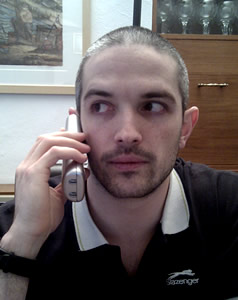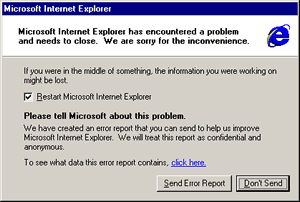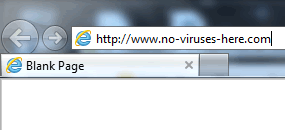Don't Catch a Virus Over the Phone!
 My ability to identify a person's nationality from their accent leaves much to be desired, especially over the phone. So when I say I got a call the other day from a guy with a foreign accent, it's intended as a politically correct way to describe someone who might be calling from one of those rather inappropriate call centres. Or in this case perhaps something equally foreign but much more malicious.
My ability to identify a person's nationality from their accent leaves much to be desired, especially over the phone. So when I say I got a call the other day from a guy with a foreign accent, it's intended as a politically correct way to describe someone who might be calling from one of those rather inappropriate call centres. Or in this case perhaps something equally foreign but much more malicious.
After 10 or 15 minutes it became clear that he was claiming to be calling from Microsoft. Other key words I managed to glean from the rather one-sided conversation were "error reports", "viruses", "slow", "freezing", "crashing" and other sporadic terms which gave a clear impression that he wanted me to grant him access to my PC in order that he might clean it all up for me and solve all my problems.
Perhaps you're familiar with the Windows "error reporting" service. It's the window which, after some kind of error or software instability occurs, pops up on the screen asking if you'd like to send the details of the error to Microsoft. The intention is that they will receive hordes of similar error reports with lots of seemingly random numbers which, rather like a mosaic, will paint something of a picture when observed in aggregate. It's also worth noting here that the very same box makes it abundantly clear that any information sent to MS is done so completely anonymously and doesn't include anything that can be used to identify you or your PC. What's more, nobody actually looks at the individual reports; they're instead collected and processed automatically.
 It's by this means only that Microsoft retrieve information from users of Windows regarding stability and incompatibility issues. Nobody has legal access to observe the way you use your PC and Microsoft certainly don't employ anybody to look out for us as individuals, much less call you up on the phone and volunteer assistance. In fact Microsoft has only just announced this month that they have launched a new US-only 'premium technical support service' by which they will charge $99 to perform some fairly basic maintenance tasks on your PC remotely.
It's by this means only that Microsoft retrieve information from users of Windows regarding stability and incompatibility issues. Nobody has legal access to observe the way you use your PC and Microsoft certainly don't employ anybody to look out for us as individuals, much less call you up on the phone and volunteer assistance. In fact Microsoft has only just announced this month that they have launched a new US-only 'premium technical support service' by which they will charge $99 to perform some fairly basic maintenance tasks on your PC remotely.
The point I'm driving at is that when you have a problem with your PC, who ya gonna call? Certainly not Microsoft. The problem is invariably caused by your hardware, which wasn't supplied by Microsoft, or software either you or your PC manufacturer added. Similarly, if you've ever received a call about your PC (I think this is actually my first, in many years) it's certainly not going to be from Microsoft showing a personal interest in your PC's health. They have bigger fish to fry. You can't even buy their software directly from them - it's all handled through resellers.
 With no identification, and no prior knowledge of me or my system offered, my caller was quick to suggest that I open Internet Explorer and browse to a location where presumably he could have me download a piece of software that would grant him control of my machine. From that point he would "remove viruses" and prevent my PC "crashing and freezing". Or perhaps plant a few of his own.
With no identification, and no prior knowledge of me or my system offered, my caller was quick to suggest that I open Internet Explorer and browse to a location where presumably he could have me download a piece of software that would grant him control of my machine. From that point he would "remove viruses" and prevent my PC "crashing and freezing". Or perhaps plant a few of his own.
The mystery caller is likely counting on statistical certainty. These days the chances are high that you own a PC that you use on a regular basis, and that it underperforms (never skimp when buying a PC - it's never worth it), often crashing or freezing, or doing strange and unwanted things. So it's understandable that someone might consider themselves lucky to be the recipient of such a charitable call, and proceed to grant anonymous access to their PC.
My name's Dave, I'm the Wincanton Window Webmaster, and I work in Wincanton as a self-employed IT professional. My company, Link-2, provides general IT support locally and at very modest prices - you'll find us in the Wincanton Directory. I'm more than happy to help those with computer or website related problems. Feel free to if you have any concerns and would like some help or advice.
If you're in that boat, having received a call or not, it's not such a bad idea to get your machine checked out anyway. My business acts as a conduit through which I hear about all the latest issues affecting people and their computers. I've had first-hand experience of this kind of scam but I've also had the same and similar problems reported by other Wincantonians in the last 12 months. I hear there's also been talk of this problem on at least one local Facebook page.

It's important to be assertive and treat such callers as you would a strange man at the door wanting to check out your gas or electricity. It seems there's been a rise in telephone-induced computer scams.
Of course all of this has been speculation, thus far. Could I have been wrong? Maybe they did call me and offer to help me with a problem I wasn't aware of. If that's the case, you'd think he'd say goodbye...
Dave Smith
PS: If you've received such a call of your own, perhaps you could describe your experience in a comment below so that others might more confidently avoid similar scams.
Comments
Login to comment!